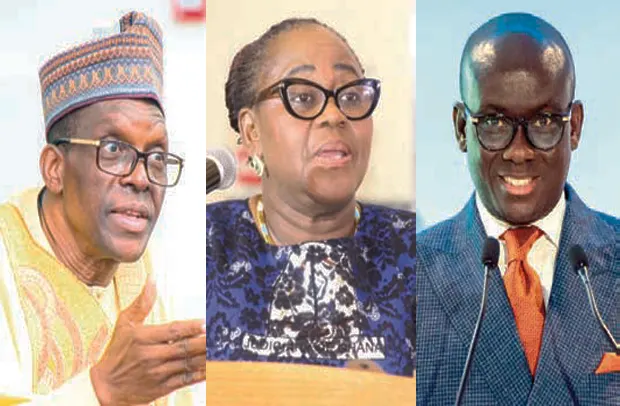Alban Bagbin, Chief Justice Gertrude Torkornoo, Godfred
Yeboah Dame
The Supreme Court (SC) yesterday dismissed an application by the Speaker of Parliament, Alban Bagbin urging it to reverse its decision to issue an interlocutory injunction against his declaration of four seats vacant in Parliament.
A five-member panel of the court presided over by Chief Justice Gertrude Sackey Torkornoo held that the court’s earlier decision was lawful, as the court had jurisdiction to issue a judicial review against any individual or arm of government, including Parliament as guaranteed by the 1992 Constitution.
The court, in its decision, essentially held that it was erroneous on the part of the Speaker to assume that his decisions are not subject to judicial review by the Supreme Court because it was not a judicial decision, holding that not even the President or the Vice President are exempted from abiding by the decisions of the court.
The court relied on Article 2(2) of the 1992 Constitution which gives the court power to give such directions as it may consider appropriate for giving effect, or enabling effect to be given, to the declaration so made.
Justice Torkornoo went ahead to mention the consequences on any individual failing to carry out the terms of the order or direction of the Supreme Court “which constitutes a high crime.”
Application
The Speaker of Parliament filed an application asking the Supreme Court to reverse its decision that halted his declaration of four seats vacant in Parliament.
The affected Members of Parliament (MPs) include Peter Yaw Kwakye-Ackah (Amenfi Central), Andrew Asiamah Amoako (Fomena), Kwadjo Asante (Suhum), and Cynthia Mamle Morrison (Agona West).
Moving the motion, Mr. Sory argued that the suit filed by Majority Leader Alexander Afenyo-Markin, which led to the grant of the injunction, was filed contrary to the rule of the Supreme Court, and that the court lacked jurisdiction.
He said the issue of whether the Members of Parliament had crossed-carpet should have been a matter to be determined by the High Court and not the Supreme Court.
Again, Mr. Sory argued that the ruling of the Speaker is not an executable decision to be a subject of an application for stay of execution.
Opposition
The application was opposed by Paa Kwesi Abaidoo, counsel for Mr. Afenyo-Markin as well as the Attorney General and Minister for Justice, Godfred Yeboah Dame, who all held that the court had jurisdiction to entertain constitutional interpretation matters.
Mr. Dame argued that the application was offensive and unknown to the rules of court, as it failed to properly invoke the review jurisdiction of the court.
He held the view that the Speaker misconstrued the jurisdiction of the Supreme Court, stating that there is no better mechanism to defending the constitution than seeking an interpretation of the constitution whenever there are rival meanings placed on a provision of the constitution.
Mr. Abaidoo, on his part, argued that the Speaker was seized with the processes filed by Mr. Afenyo-Markin yet went ahead to deliver his ruling.
It was his case that the order of the Supreme Court granting a stay of execution of the ruling of the Speaker does not result in any interference with the business of Parliament.
Ruling
The panel members, including Justices Mariama Owusu, Samuel Asiedu, Ernest Gaewu and Yaw Darko Asare, said it is the fundamental right of every Ghanaian to ensure the protection of the constitution, and the Supreme Court is the only court clothed with jurisdiction to interpret the constitution.
The court said it is, therefore, a misinformation and misrepresentation that the Supreme Court has no jurisdiction to interpret Article 97 of the Constitution.
The court found that nothing can be clearer from the record of Parliament brought before the court that this was an executable ruling, as the Speaker’s ruling affected the seats of the four MPs as well as their constituencies.
The court also held that it had jurisdiction to hear the matter ex parte because of the exceptional circumstances of the case where the four MPs were virtually booted out of Parliament without any consideration to the fact that the nation was just a few weeks away from a general election and a by-election cannot be held to replace the four MPs.
The court added that the Supreme Court is satisfied that the Speaker was well served with the suit before he delivered his ruling, and that resulted in exceptional circumstances for the Supreme Court to hear the ex parte motion and subsequently halt the execution of the Speaker’s ruling.
Meanwhile, the court has given the Speaker up to November 6, 2024 to file his statement of case and memorandum of issues taking into consideration processes filed by the other parties. Hearing continues on November 11.
BY Gibril Abdul Razak


